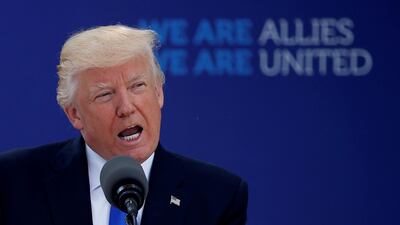With Nato leaders' annual meeting to be followed by a US-Russia presidential summit, the business of international security is increasingly on people's minds.
Is protection about to become a sunshine commercial sector now that Donald Trump increasingly seems to suggest America’s traditional security alliances be repaid in kind and that the US receive trade preferences and other economic benefits in exchange?
Tweeting on July 4, America's 242nd birthday, Mr Trump demanded that the Organization of Petroleum-Exporting Countries lower the price of oil because "the United States defends many of their members for very little $'s". On the same platform some months ago, the US president lamented the "MASSIVE trade deficit with Germany, plus they pay FAR LESS than they should on NATO & military. Very bad for US. This will change."
The implications are clear. US security guarantees are no longer meant to be about sworn treaties, shared values, or about that higher ideal – keeping the peace. They are a commodity, to be traded at will.
The mere suggestion that America could embrace an openly mercantile approach to military protection raises the possibility of other countries doing the same. Would China, which has the world’s largest standing army, and Russia, which has the fifth largest, not muscle in too?
China might do rather well in the security business in Asia and Africa. Russia has already shown what it can do in Syria and payback is likely to be in the form of lucrative oil and gas contracts.
What’s to stop India, with the world’s second largest army, from hawking security services in South Asia, along the Indian Ocean and further afield? What about North Korea, which at 1,190,000 active military, is only 157,300 behind the United States? After all, North Korea is poor and burdened with sanctions. It cannily trains its forces in asymmetric warfare techniques in order to take on more high-tech militaries and has, for years, honed the skills of revolutionary and insurgent groups in disparate parts of the world.
_______________________
Read more from Rashmee Roshan Lall:
Summitry is best summed up by satire – if only it wasn't so accurate
Football could be the great equaliser when it comes to the wealth of nations
Trump of all people should know that corporate patriotism is neither natural nor desirable
_______________________
Just a few years ago, a prominent South Korean newspaper reported that Pyongyang sent military officers to Syria to provide logistical support to President Bashar Al Assad's forces.
The idea that nation-states would sell professional soldiering to the highest bidder is hardly new. Until the 19th century, citizen armies were the exception rather than the rule. And even when states created professional armies of their own, some remained open to mercenaries. Nepalese Gurkhas still serve in the British and Indian armies in a relationship going back centuries, as well as in the Singapore police and in Brunei.
Not all mercenaries are recompensed in cash. France’s 187-year-old Foreign Legion continues to welcome recruits with the assurance of French citizenship after a few years of service. Even the 21st century US military has routinely taken in foreigners on the understanding that army service would guarantee speedy naturalisation.
That is a straightforward trade of mutual profit – citizenship in exchange for military service – and it is only under Mr Trump’s administration that the US seems less inclined to accept foreign soldiers within its ranks. A few dozen recruits have recently learnt they’re being discharged and the original promise of fast-track citizenship will not be redeemed.
The mercenaries’ modern avatar – private military contractors – should be worried. The prospect of national armies for hire would create a whole new marketplace for global security. Were that to happen, the new world order would start to look a lot like an older one when great military powers carved out spheres of influence for base political and monetary profit, and the minnows swam in and out, in restless search for the best security deal.
In this century, it would mean the rise of a new militarism and the end of an era of idealism. There have been many conflicts after the Second World War, but the imperfect aspiration for peace has remained a constant. That could change.
Consider what might happen if, for instance, Mr Trump told Russian President Vladimir Putin at their July 16 Helsinki summit, that the US will recognise Russia's annexation of Crimea. Countries around the world would seek to redraw borders by force. They might do so by means of their own armies, or by calling in hired ones.
This would recreate, in a different key, the so-called German “soldier trade” – the 17th and 18th century practice of lesser German princes hiring out their soldiers to anyone who would pay, sometimes even on opposing sides of the same war.
The concern is not just a high-minded disdain for what went before; it is about self-preservation. The technology of war is so far advanced this century that a profit-led, nuclear-armed militarism could be truly cataclysmic.


